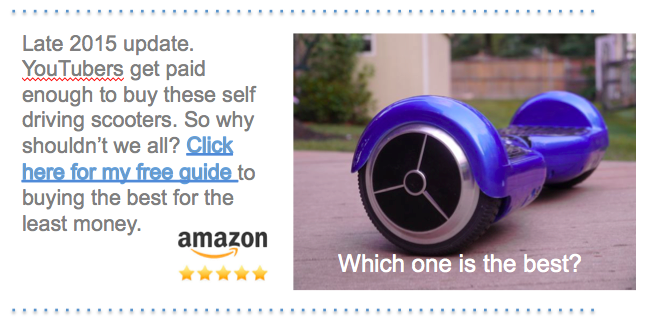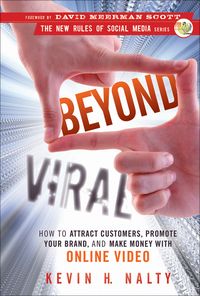Here’s an excerpt of a wonderful post on Cracked.com titled “YouTubers That Will Never Be Famous.” It’s an opportunity for me to “clear the air” about being a self-proclaimed “weblebrity” (which is, you see, rather distinct from being a celebrity). LONG post, here, folks but this one is jam-packed with delicious goodness.
The internet is a big place, but there can only be so many Tay Zondays and LonelyGirl15s. Not everyone can become a crossover internet celebrity, and behind every one of these superstars there are a thousand others just like them, posting video after video and hoping one of them sticks. The following users represent only a fraction of a percentage of the YouTube users currently clogging up the internet tubes with absolute garbage – if you can think of others that deserve to be shamed, feel free to add them in the comments below. Or don’t, actually – additional exposure will only encourage them.
Let’s start by explaining that securing weblebrity status facilitates all the dysfunction of being a real celebrity, but none of the perks. You see, you receive hundreds of messages a day from viewers critiquing your work (probably more than many movie stars). The positive comments give you false self esteem, and the negative ones crush you like a lemon wedge. Eventually you develop thick skin, stop posting, or decide to find your self worth in a more healthy place (like at the bottom of a nice glass of vodka stired by a Xanax).
But, friends, there are at least 5 perks:
- We get constructive feedback about what people like and don’t like about our mindless short-form entertainment (so in theory we learn). People look forward to our stuff, and that’s encouraging. Remember that three years ago we bored dinner guests with our videos.
- We have a lot of fun. Shooting videos, editing them, collaborating, meeting fellow creators.
- Some of us actually get paid by YouTube based on a percent of the revenue it makes from selling ads around our garbage.
- We don’t really clog up the Internet. You see, there’s plenty of bandwidth around. It’s kinda like saying someone is wasting your sunshine (there’s an unlimited supply last I checked). Your tan doesn’t come at my expense… unless I have to look at your digusting, peeling skin.
- We don’t answer to anyone except our audiences. No producers to tell us to “dial it down,” or sponsors forcing awkward insertions. No “review team” or fear of cancellation.
Now let’s look at VisibleMode. Do I watch him daily? Nope. Does he watch me? Probably not, except when I happened to pick him for the YouTube Secret Santa (I sent him a mug so he could sell out like me).
VisibleMode is one of the top YouTubers in Canada, and Cracked.com’s pick for someone who won’t get famous. Obviously it would be even more interesting to see a Cracked.com list of the few YouTubers that actually might get famous (a harder list to write, and a shorter one).
So now I’ll get to my point, which Cracked might have overlooked. VisibleMode may not soon be in a b-grade film or even an extra in a television commercial. Heck even Michael Buckley (one of the fastest growing, and television-ready weblebrities) may fade like many stars. But VM tells me today he’s had 6,760,748 cummaltive views of his videos. If Google sold those InVideo ads surrounding his videos at $20 per thousand ($20 CPM is the list price), VisibleMode would have hypothetically taken a portion of more than $135,000 that advertisers would pay YouTube/Google. Let me say it again. Even if most of the ads weren’t sold, the CPM wasn’t $20, and VisibleMode only got a small portion, he’d be making decent take-home per month. Will it last? I’m the wrong guy to ask, because I would have bought Revver stock. But I’ll bet he’s enjoying the ride and not too worried about missing a red-carpet event in LA.
The sustainability of YouTube and weblebrities, of course, hinges on advertisers garnering an ROI on the ads that surround this content. They’re fairly targeted and hard to ignore. And they’re in the context of content you’ve chosen to view. So the branding benefit should be worthwhile (a cent or two an impression) even if the direct-response may underwhelm more transactional brands.
So assuming marketers sell products (or believe they are) via YouTube promotion, the advertising revenue will flow. A shake-down of creators will naturally occur, but the audience of YouTube is growing in depth and frequency, and media consumption continues to fragment. There’s a volume of valuable ad inventory lurking in the long tail, folks…. so...
- Weblebrities might enjoy a decent side income without ever becoming “famous.”
- Viewers will have a greater selection of garbage to fit their unique tastes- some cheesy stuff blended with unique, unscripted and short entertainment.
- YouTube/Google will make some money as well-backed middleman. Heck maybe they’ll buy Cracked.com.
- Advertisers should enjoy a decent ROI in an emerging medium that’s bound to resemble future television buys more than current television ads will.
Nalts may or may not appear on SNL, but he’s having fun while this lasts. I just wish Cracked would have picked me for someone who’d never get famous. Hey- I know. I’ll do a sunburn video. Worked for ShayCarl.



